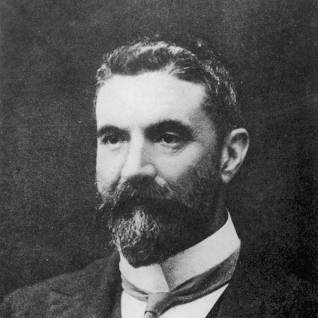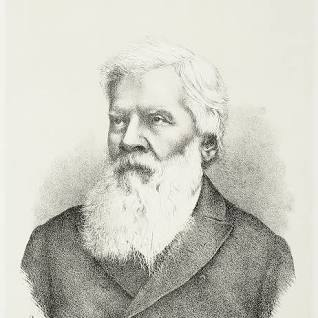Another
week is here and as it is Monday I am going to tell you a little
about another Australian this time it is, Sir Edmund Barton.
Sir
Edmund "Toby" Barton GCMG KC was an Australian statesman,
barrister and jurist who served as the first prime minister of
Australia from 1901 to 1903, holding office as the leader of the
Protectionist Party. He resigned to become a founding member of the
High Court of Australia, on which he served until his death.
He
was born in Glebe in New South Wales on the 18 January 1849, He was
one of the nine children of William Barton and Mary Louise Whydah,
English immigrants who arrived in Australia in 1824. William was a
secretary and accountant for an agricultural company, and later
became a stockbroker. Mary ran a school for girls.
Barton
attended Fort Street School from 1856 to 1858, and then went to
Sydney Grammar. He went on to the University of Sydney, from which he
graduated with a Bachelor of Arts degree in 1868, and a Master of
Arts in 1870.
He
became a barrister in 1871 and set up a successful legal practice,
joining the Sydney Mechanics Institute to learn the art of debating.
He married Jane (Je anie) Mason Ross in 1877, and together they had
six children.
He
was certainly qualified for his new job. He had been a member of the
Parliament of New South Wales for 20 years, and had served terms as
Speaker of its Legislative Assembly, Attorney-General and Leader of
the Opposition.
Barton
had worked on Federation for 10 years, and became Australia’s first
Prime Minister because the supporters of Federation trusted him.
He
entered New South Wales colonial politics in 1877, standing
unsuccessfully as a candidate for the University seat in the
Legislative Assembly, but winning the seat in 1879. He switched to
the Wellington seat in 1880, then in 1882 to East Sydney, which he
held until 1887.
Barton
was an appointed member of the Legislative Council from 1887 to 1891,
then regained East Sydney in 1891, held it until 1894, and lost it
again. He became a member of the Legislative Council again from 1897
to 1898, and was then re-elected to the Legislative Assembly for
Hastings-Macleay, which he represented from 1897 to 1899.
He
held various positions while a member of colonial parliament,
including Speaker of the Legislative Assembly 1883–87,
Attorney-General 1889 and 1891–93, and Leader of the Opposition
1898–99.
Barton
and his supporters conducted a vigorous pro-federation campaign
preceding the June 1898 referendum on federation. The constitution
was accepted by the required majority in South Australia, Tasmania
and Victoria, but not in New South Wales.
At
the New South Wales election in July 1898, dominated by the
federation issue, Barton won the seat of Hastings-Macleay and thus
returned to the Legislative Assembly. In September 1898 he replaced
the anti-federationist, William Lyne, as Opposition Leader.
The
Premier, George Houston Reid, and Barton worked together to promote
the federal cause to the New South Wales electorate. From April to
July 1899 a second referendum on federation was conducted in New
South Wales, South Australia, Tasmania and Victoria, each of which
accepted an amended constitution by a larger majority than in June
1898. On 2 September that year, Queensland, voting for the first
time, approved the bill.
Barton
led the Australian delegation to London in early 1900 to negotiate
amendments to the Constitution Bill the UK Government desired, and to
oversee the safe passage of the Bill through the UK parliament.
On
9 July 1900 Queen Victoria gave Royal Assent to the Act to constitute
the Commonwealth of Australia.
On
18 July 1900 Lord Hopetoun, former governor of Victoria (1889–95),
was named as inaugural Governor-General of Australia.
Among
the first Acts of Barton’s government in 1901 was legislation to
restrict immigration, thus instituting the White
Australia policy. (so not right in my opinion)
The
Commonwealth
Franchise Act 1902 established
uniform federal franchise. This gave the vote to adult British
subjects resident in Australia for at least six months, but excluded
Aboriginal and Torres Strait Islander people, and African and Asian
immigrants.
The
legislative task of the first parliament was to establish a
Commonwealth administration. Parliament passed 59 of the 84 bills
introduced by the Barton government, including 21 money
(appropriation and supply) bills. Other important legislation
included:
Acts
Interpretation Act 1901 which
set out standards and conventions for drafting all subsequent bills
Audit
Act 1901 provided
for supervision of government spending and reporting to Parliament
Customs
Act 1901 and
Excise
Act 1901 which
were revenue-raising Acts
Judiciary
Act 1903 to
set up the High Court.
Defence
Act 1903 to
establish control of military and naval forces.
Immigration
Restriction Act 1901 to
implement the White Australia policy.
Ok
I have bored enough for this post.


























